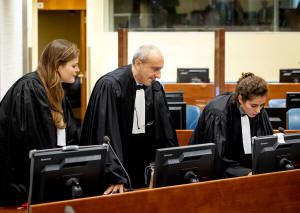Long-awaited Rwanda genocide trial starts despite suspect's boycott
 Send a link to a friend
Send a link to a friend
 [September 29, 2022]
By Stephanie van den Berg [September 29, 2022]
By Stephanie van den Berg
THE HAGUE (Reuters) -A U.N. tribunal in The
Hague opened the genocide trial on Thursday of a Rwandan businessman
captured two years ago after decades on the run, with judges saying the
hearing must go on despite the suspect's decision to boycott it from his
jail cell.
Felicien Kabuga, a former businessman and radio station owner, is one of
the last suspects sought by a U.N. tribunal prosecuting crimes committed
in the 1994 genocide, when ruling Hutu majority extremists killed more
than 800,000 minority Tutsis and Hutu moderates in 100 days.
"Mr Kabuga is this morning well but has decided not to attend the
hearing this morning either in person or via video link," Judge Iain
Bonomy said.
"The trial must proceed" with the opening statement of the prosecutor,
judges decided.

Kabuga is in his mid-to-late 80s, though his precise date of birth is
disputed. He was arrested in May 2020 in Paris between COVID-19
lockdowns and extradited to The Hague where he has entered a not-guilty
plea.
Prosecutors have charged the former coffee and tea tycoon with three
counts of genocide and two counts of crimes against humanity, primarily
for promoting hate speech through his broadcaster, Radio Television
Libre des Milles Collines (RTLM).
He is also accused of arming ethnic Hutu militias.
"In support of the genocide, Kabuga did not need to wield a rifle or a
machete at a road block. Rather, he supplied weapons in bulk and
facilitated the training that prepared the Interahamwe (Hutu militias)
to use them," U.N. prosecutor Rashid Rashid said in his opening
statement.
[to top of second column]
|

Defence lawyer Emmanuel Altit (C) of
Felicien Kabuga in court at the UN International Residual Mechanism
for Criminal Tribunals (IRMCT) in The Hague. KOEN VAN WEEL/Pool via
REUTERS

Rashid added that Kabuga had founded a radio station that "broadcast
genocidal propaganda across Rwanda".
Prosecutors said the genocide charges covered rapes and sexual
assaults as well as killings. Hutus were encouraged in RTLM
broadcasts to "taste" Tutsi women, they said.
U.N. prosecutor Serge Brammertz told journalists after Thursday's
hearing that Kabuga's no-show was "a strategic decision from his
side" but said it would not affect the proceedings.
Because of Kabuga's advanced age and fragile health the court will
only sit for six hours a week, divided over two days. Brammertz said
the prosecution case will take several months.
"Time is essential here so we hope this trial can proceed as fast as
possible, " Brammertz said.
The defence is due to make its opening statement when the trial
resumes on Friday.
(Reporting by Stephanie van den BergEditing by Anthony Deutsch,
Peter Graff and Andrew Heavens)
[© 2022 Thomson Reuters. All rights
reserved.]
This material may not be published,
broadcast, rewritten or redistributed.
Thompson Reuters is solely responsible for this content.
 |